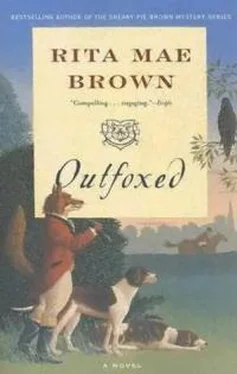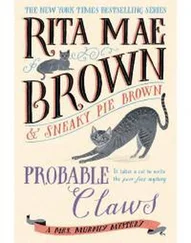As they batted pros and cons back and forth, as well as Martha Howard’s future, Sister listened. She thought to herself, if only Raymond Junior had lived. He’d be old enough now to assume the responsibilities of a joint-master. She’d always dreamed of that. She snapped out of her reverie. “Don’t question the will of God,” she said to herself, then said to the ladies, “I really do appreciate your concern for the hunt.”
“Not just the hunt, Sister Jane, we appreciate you. Can’t you go along for one more year as sole master? Surely something will turn up or resolve itself,” Lottie inquired earnestly, her soft brown hair framing her square face.
“I’ve said that for the last five years.”
“You’re stronger than we are. Wait five more.” Betty echoed what the others were thinking.
“I don’t know. There’s a black young vixen on the farm. You know everything happens in the black fox years.”
The ladies knew the black fox legend. “That doesn’t mean it’s going to happen to you,” each said in her own way.
“Well—I hope not.” She was tempted to tell them about the lone figure on Hangman’s Ridge but decided that would be between her and Doug Kinser. “But let’s change the subject to something more cheerful or challenging. Can you imagine Crawford Howard without his clothes on?”
CHAPTER 27
The old office in the center of town exuded a sepulchral air. The sturdy white Doric columns, the large iron doors boasted of public wealth, solidness, and civic duty. Built in 1926 on a flood tide of government spending and public speculation, the post office, like the country that spawned it, witnessed the subsequent depression, another world war and three smaller ones, more economic booms and busts.
When the post office was being built, slabs of granite lying along Main Street, men came to the post office wearing coats and hats. If it was summer, they wore jaunty straw boaters. In the winter, fedoras and borsalinos predominated. Ladies festooned in hat, gloves, purse, and shoes dyed to match sashayed onto the black marble floors. The very colors the ladies wore announced their feelings about the day and about themselves. Farmers, some still driving teams, would tie up at the gray iron balustrade designed for that purpose. Wearing overalls and straw hats in the warm weather, they’d stride into the halls cheerfully greeting everyone, stopping to talk about that riveting subject: the weather.
As Crawford Howard pushed open the heavy doors with his back he harbored none of these memories. A post office was simply a post office to him, not a community statement. But it remained a federal building and therefore a citizen trust. An American can enter a post office at any time of night or day to deposit mail in the shining brass slots, to open their own large or small mailbox with their key.
People didn’t dress to go downtown anymore. They barely pulled themselves together, properly groomed, to attend church. The South and especially Virginia practiced a dress code much stricter than that of the rest of America but even here in the bosom of courtliness standards were falling. Many wore jeans and T-shirts. Businessmen still paid attention to their furnishings, as did those ladies who were hoping to catch a businessman’s eye. But even their standards of dress were lower than just thirty years before.
Crawford reached the slots and slid the mail in. One brass slot was marked with the town’s zip code, another was marked VIRGINIA, and a third was marked OUT OF TOWN but it may well have read OFF THE WALL . Virginians, without making noise about it, quietly, calmly, considerately believed any activity of importance took place within the state’s borders. From the Potomac to the Dan River, from the Atlantic to the early steep folds of the Alleghenies shared with its rebellious sister, West Virginia, this was the center of the universe.
Even Crawford, as he methodically tossed the mail in the slots, listening for the satisfying soft thunk on the other side as it hit a mail basket, even he who knew the world had adopted this point of view. What was Nairobi, London, New York compared to Charlottesville, Fredericksburg, or the dowager herself, great fusty Richmond? Crawford, a direct and active man, hardly realized the seductiveness of the area. When he repaired here with Martha, flush with the first fortune he’d made, he came for the beauty of the place and because it was an hour by air to New York City, only fifteen minutes more by air to Atlanta. Washington, D.C., was a half hour by air or an hour and a half by car if no state troopers prowled the corridors to that corrupted seat of power. He certainly did not move to central Virginia for the people. He made fun of them, decrying them as parochial, falsely genteel, and silently racist.
When Virginia elected Douglas Wilder, the first black governor in the history of the United States, he questioned his stand on Virginia’s racism. The more he thought about it, the more he decided Virginians were no more racist than New Yorkers.
As the years rolled along he would travel out of state and find himself irritated by the lack of grace in random encounters. He began to fume about the manner in which people drove in Boston and once in Los Angeles he upbraided a man at a business meeting for not wearing a suit and tie. He told the young man that he was being disrespectful to the other men at the meeting. One should always consider the effects of one’s dress and demeanor on others.
This is not to say that Crawford Howard, born and bred in the hurly-burly of Indianapolis, that gritty competitor to massive Chicago, had become a Virginian. This is only to say that the state of Virginia, her siren song sweet and strong since 1607, had filtered into Crawford’s ears.
He began to tip his hat to ladies even if only a baseball cap. He smiled at older women and told them they were alluring. Before telling a male competitor how wrong the competitor was, Crawford might even say something like “Have you considered this . . . ?”
The natives first ignored him. In their eyes he was a rich barbarian. Over time, his good qualities—vision, responsibility, and determination—won praise from some. He cared far too much about money and talked about it and business far too much but he had come a long way.
Fontaine Buruss, of course, would never give him credit for smoothing over his rough edges. There were those who agreed with Fontaine but they were often the same people who, if living in England, would not speak to you if you couldn’t trace your lineage back to William the Conqueror. William and his men had a lot to answer for.
As Crawford picked up the now empty carton, he walked under the cream-colored swinging bowls of light, lamps hanging by heavy chain; he passed the long tables whose red marble tops contrasted richly with the black marble floor. He paused for a moment to consider whether the drunk sleeping on a marble bench in the corner was still alive. He was and Crawford pushed open the door, walking down the cascade of broad steps to his Mercedes.
He cruised by Martha’s apartment. He told himself he was curious. Then he motored by Fontaine’s office. The light was on. A bead of sweat appeared at his left temple even though the temperature was now fifty-four degrees. He parked in the lot across from Fontaine’s office. The sweat rolled down to his chin. He wiped it off, walked into the lobby, and knocked on the door.
“Who is it?” Martha’s voice called out.
“Your beau.” He liked the sound of that.
He heard a muffled exchange. “Come in,” Martha said.
Fontaine and Martha, bending over a drafting table, stood up to greet him.
“Hello,” Fontaine coolly said.
“Hello,” Crawford replied to equal degree.
Читать дальше












